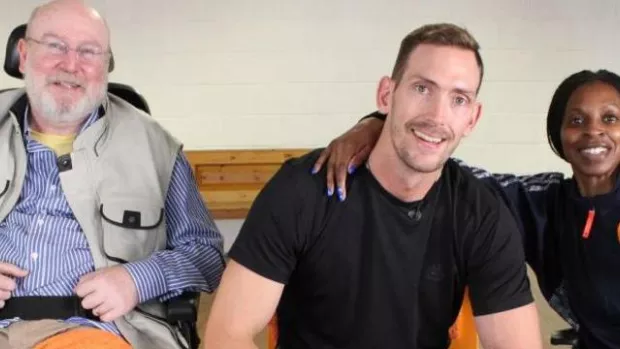
Exercise and MS at the ECTRIMS research conference
This morning, the ECTRIMS research conference hosted a Hot Topics session on lifestyle and MS. Professor Ulrik Dalgas talked about exercise and MS.
Ulrik said exercise and MS is a topic that’s really evolved over the past 10 to 20 years. For a long time, exercise was quite controversial in MS. Many neurologists advised against exercise.
But we know exercise is one of the few things that benefits most of our tissues and organs. Little else has this very broad effect, with no (or at least only very mild) side effects.
And he said we’re now on a really good path with this research area in MS. There’s some big studies currently going on. And he’s already worked with other experts to publish recommendations on exercise and physical activity in MS.
Read the recommendations on exercise and physical health
Exercise can help MS symptoms
Ulrik said you find in the literature that exercise does help many of the most common MS symptoms. This includes walking difficulty, pain and fatigue. And it can have a positive effect on quality of life. Together, he says, this all adds up to something important for people with MS.
So he thinks it’s fair to say exercise can be an effective symptom management treatment.
But he does say cognitive symptoms may be different. Here, he says, evidence in the literature shows exercise can positively impact some areas of cognition, like memory and concentration. But if you look at it on a more overall basis, a recent review found no effects of exercise on cognition in general.
Exercise may help reduce relapses
One of the big questions, Ulrik says, is whether exercise could be a potential disease modifying treatment (DMT). He said relapse activity is the place where we have the strongest evidence for this.
Some years ago, a review showed people who exercised had fewer relapses than control groups. And a more recent study found a similar effect on the relapse rate. It confirmed what they already knew, but using a design that followed people over a number of months.
Evidence on whether exercise could be a DMT is still sparse
Unfortunately, he said, the evidence is more sparse in other areas, like brain volume loss. Losing brain volume can be a sign that your nerves are being damaged. So he said at the moment it doesn’t look as encouraging as they’d like it to be.
In two pilot studies, they looked at the effect of exercise (endurance exercise and aerobic exercise) on brain volume. He said in both studies, the pattern indicated exercise might preserve brain volume compared to people who didn’t exercise.
But the statistics weren’t strong in these studies because they were so small. So we need bigger studies, over longer time periods, to really resolve this in the coming years.
Starting exercising early could be important
We know MS can use up brain reserve. That’s the brain’s ability to compensate for damage. So Ulrik also wants to find out whether exercise at the very beginning of MS, might lead to better outcomes. He calls this ‘prehabilitation’. Trying to build your brain’s reserve at the start, rather than trying to restore what’s lost later on.
He said in one study, when mice with an MS-like condition started exercising straight away, they could see a clear pattern that those animals had a milder MS course than the ones not exercising. But the evidence isn’t clear with people yet.
He has preliminary data from people who’d had MS for less than two years. He was disappointed to find exercise didn’t reduce relapses or brain volume loss. But it did have some positive effects on important nerve fibres involved in movement. So he says maybe there is something there.
Exercise studies need to include more diverse people with MS
Ulrik said they recently did a review looking at the characteristics of people with MS taking part in exercise studies.
They found no studies in older people. People with MS over 60 have hardly been investigated, even though they make up over a third of the people living with MS. And people who are more severely disabled have only been sparsely investigated. So they need to find ways to involve more people.
Read the study on cognition and exercise
Read the study on endurance exercise and brain volume
Read the study on aerobic exercise and brain volume
Read the study on the effect of early exercise on mice with an MS-like condition
Read the study on exercise in people with early MS
Read the review of characteristics of people taking part in exercise studies



